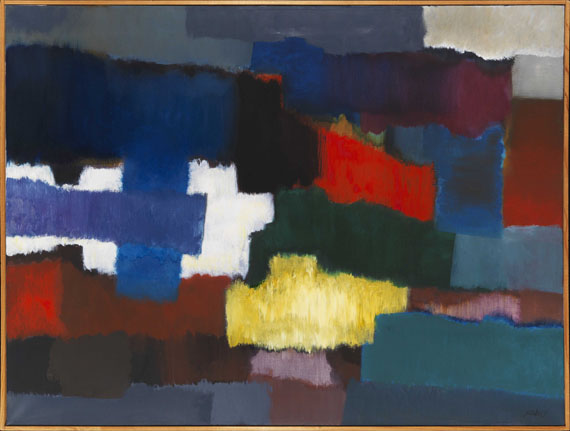232
Fritz Winter
Hell einfließend, 1965.
Oil on canvas
Estimate:
€ 70,000 / $ 81,200 Sold:
€ 193,750 / $ 224,749 (incl. surcharge)
Hell einfließend. 1965.
Oil on canvas.
Lohberg 2534. Signed and dated in lower right. Verso signed, dated and titled, as well as with several crossed-out inscriptions. 97 x 130 cm (38.1 x 51.1 in).
• Large-size powerful composition characterized by the tension between the bright red, blue and yellow.
• Through the rectangular and serial pictures Winter attains a remarkable emancipation and dynamzation of color.
• Winter is one of the main protagonists of German Informalism and post-war abstraction.
• Winter exhibited in the U.S as early as in the 1950s and was represented in two exhibitions at the Museum of Modern Art, New York.
PROVENANCE: From the artist's estate.
Fritz-Winter-Foundation, Munich (around 1986, with two crossed-out labels of the Bavarian State Painting Colelction on the stretcher).
Galerie Gunzenhauser, Munich.
Collection Deutsche Bank AG, Frankfurt a. M. (acquired from aforementioned).
EXHIBITION: Fritz Winter. Zum 60. Geburtstag, Galerie Günther Franke, Munich 1965, no. 27 (with a label on the stretcher).
Man lebt im Wirken der Schöpfung. Fritz Winter zum 100. Geburtstag, Kunst-Museum Ahlen, September 10, 2005 January 29, 2006.
Oil on canvas.
Lohberg 2534. Signed and dated in lower right. Verso signed, dated and titled, as well as with several crossed-out inscriptions. 97 x 130 cm (38.1 x 51.1 in).
• Large-size powerful composition characterized by the tension between the bright red, blue and yellow.
• Through the rectangular and serial pictures Winter attains a remarkable emancipation and dynamzation of color.
• Winter is one of the main protagonists of German Informalism and post-war abstraction.
• Winter exhibited in the U.S as early as in the 1950s and was represented in two exhibitions at the Museum of Modern Art, New York.
PROVENANCE: From the artist's estate.
Fritz-Winter-Foundation, Munich (around 1986, with two crossed-out labels of the Bavarian State Painting Colelction on the stretcher).
Galerie Gunzenhauser, Munich.
Collection Deutsche Bank AG, Frankfurt a. M. (acquired from aforementioned).
EXHIBITION: Fritz Winter. Zum 60. Geburtstag, Galerie Günther Franke, Munich 1965, no. 27 (with a label on the stretcher).
Man lebt im Wirken der Schöpfung. Fritz Winter zum 100. Geburtstag, Kunst-Museum Ahlen, September 10, 2005 January 29, 2006.
Trained at the Bauhaus in Dessau with Paul Klee, Wassily Kandinsky and Oskar Schlemmer among his teachers, Winter's abstract painting was initially considered "degenerate" by theNational Socialists, but soon after the war it becameabsolutely en vogue. In 1949 Fritz Winter along with Willi Baumeister and Rupprecht Geiger the "Gruppe der Gegenstandslosen"(Group of the Nonrepresentational)in Munich, later renamed "ZEN 49". Winter's rectangular and serialpictures from the 1960s are particularly striking for their bright colors and their flat structure which help to emphasize the pure sound of the colors. While the works fromthe 1950s are still characterized by a more linear, gestural application of paint in aninformal style, Winter's line structures fromthe 1960s begin to merge into powerful color surface structures with increasingly hardened contours. The primary colors blue, red and yellow seem to vibrate in front of a background of subdued mixed colors. The two-dimensional composition of colored areas interlocking at their edges gets its structure and depth effect solelyfrom the accentuation of the color values: Bright colors shines in front of muted colors, which optically fade into the background. In this way, Winter realizes a unique dynamization of the color. In the 1950s, Winter had several exhibitions in New York and showed his paintings, along with works by Baumeister, Nay and Schwitters, in the exhibitions "The New Decade" and "German Art of the 20th Century" atthe Museum of Modern Art, New York in 1955 and 1957. In 1959 he took part in the documenta II in Kassel. By the 1950s the latest Winter had become one of the leading representatives of German Infomalismand abstract post-war modernism. During his lifetime, Fritz Winter determined a significant part of his artistic estate to betransferredto the Bavarian State Painting Collections. Most recently, in 2018, the Pinakothek der Moderne, Munich, showed his works in a solo exhibition. [JS]
232
Fritz Winter
Hell einfließend, 1965.
Oil on canvas
Estimate:
€ 70,000 / $ 81,200 Sold:
€ 193,750 / $ 224,749 (incl. surcharge)
Headquarters
Joseph-Wild-Str. 18
81829 Munich
Phone: +49 89 55 244-0
Fax: +49 89 55 244-177
info@kettererkunst.de
Louisa von Saucken / Undine Schleifer
Holstenwall 5
20355 Hamburg
Phone: +49 40 37 49 61-0
Fax: +49 40 37 49 61-66
infohamburg@kettererkunst.de
Dr. Simone Wiechers / Nane Schlage
Fasanenstr. 70
10719 Berlin
Phone: +49 30 88 67 53-63
Fax: +49 30 88 67 56-43
infoberlin@kettererkunst.de
Cordula Lichtenberg
Gertrudenstraße 24-28
50667 Cologne
Phone: +49 221 510 908-15
infokoeln@kettererkunst.de
Hessen
Rhineland-Palatinate
Miriam Heß
Phone: +49 62 21 58 80-038
Fax: +49 62 21 58 80-595
infoheidelberg@kettererkunst.de
We will inform you in time.




 Lot 232
Lot 232 

